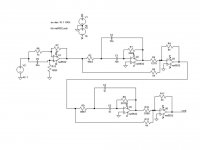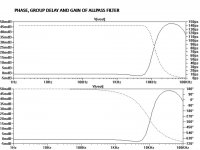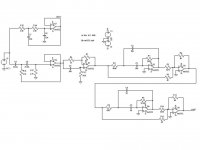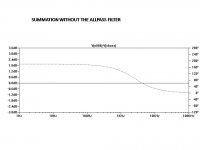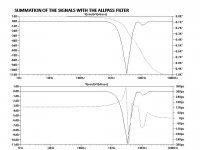hi I have a problem with an allpass filter, which function is to delay by 140us the high frequency bandwidth of an active crossover, made up with second order Linkwitz-Riley filters. I found on the internet a texas instrument note and I designed the filters using those circuits with the way described at page 46 and the coefficient they give at page 63. one of the pics shows the response of the difference of the outputs of the two filters and I obtain a flat response, as it should be, while another shows the sum, each stage is inverting thus the output of the allpass has already opposite phase than that of the treble output, of the output of the allpass with the output of the bass and I get a bad response. I don't understand where is my mistake or if LTspice is making something wrong.
Attachments
I think that the first order stage you have used is reversing the phase. You can try using the other first order all pass configuration. See this link for more info:
Linkwitz Lab: Active Filters - Delay Compensation
Just swap the positions of C5 and R13. That will likely fix the problem.
-Charlie
Linkwitz Lab: Active Filters - Delay Compensation
Just swap the positions of C5 and R13. That will likely fix the problem.
-Charlie
I don't understand what you are asking. An allpass works by adding lots of phase shift in a certain frequency region, but keeping the amplitude the same. Above and below that region it will either invert or not, depending on the design. For example, the simplest allpass will swap from inverting to not inverting as the frequency is raised (or the opposite).
If you sum/difference phase shifted signal with unshifted signal then you are likely to get sharp dips with one of them because of cancellation.
If you sum/difference phase shifted signal with unshifted signal then you are likely to get sharp dips with one of them because of cancellation.
I don't understand what you are asking. An allpass works by adding lots of phase shift in a certain frequency region, but keeping the amplitude the same. Above and below that region it will either invert or not, depending on the design. For example, the simplest allpass will swap from inverting to not inverting as the frequency is raised (or the opposite).
If you sum/difference phase shifted signal with unshifted signal then you are likely to get sharp dips with one of them because of cancellation.
I'm seconding this explanation. I had assumed that davidel94 understood this. Are you just doing a sim of the circuit? You should make a plot of the relative phase angle between the outputs with and without the delay, and the behavior of the amplitude will become more clear to you.
Why do you intend to use the delay and why choose 140us?
-Charlie
the time delay is needed in order to make treble sound wave come to the ear at the same time of bass air wave, because these two signals come from two different loudspeaker which are not on the same horizontal axis. so accordingly to what you said the problem is in the phase.
have you moved the phase EQ to the input before split to both sections of the XO yet?
It is not a phase Equaliser he is trying to make. It is a delay line consisting of a chain of allpass filters.
Davide:
I guess you are trying to delay because of the driver offset, aren't you ? In this case you will run into false results when you simply add the traces in a simulation. You would of course have to delay the woofer's output also by 140 us in order to have the same delays for both. In most simulators you could use the transmission line model for this purpose. And this is just the beginning: If you don't try to model the driver respones as well you will not get anything reasonably close to real-life.
Regards
Charles
Last edited:
so what I have understood is that in my project I have to leave the bass as it is and delay the treble, and because I cannot have a good simulation I have to make sure that the simulation of only the allpass filters give me the required delay with a flat gain of 0dB on the audio bandwidth. is it right?
The all-pass filter should yield flat amplitude gain regardless....otherwise it's not properly named. 
In order to determine the required delay for the all-pass section you need to perform acoustic measurements on your system to characterize how far "ahead" of your woofer the tweeter is.
Simulations are fine to a point, but eventually you have to incorporate real-world data into a speaker design.
Cheers,
Dave.
In order to determine the required delay for the all-pass section you need to perform acoustic measurements on your system to characterize how far "ahead" of your woofer the tweeter is.
Simulations are fine to a point, but eventually you have to incorporate real-world data into a speaker design.
Cheers,
Dave.
- Status
- This old topic is closed. If you want to reopen this topic, contact a moderator using the "Report Post" button.
- Home
- Amplifiers
- Solid State
- problem with active allpass filter for time delay
